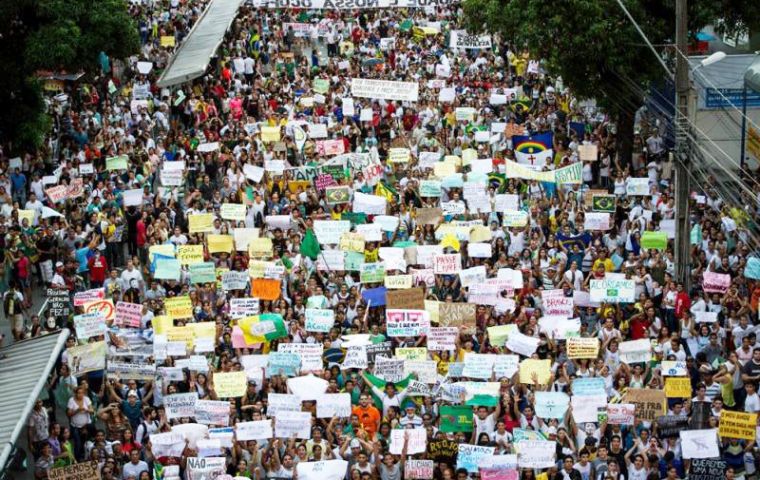MercoPress. South Atlantic News Agency
Brazil's middle and high classes support spontaneous street protests
 At one point in June over a million people turned to the streets of Brazil's main cities to protest and demand an end to corruption
At one point in June over a million people turned to the streets of Brazil's main cities to protest and demand an end to corruption Brazil's middle and high classes are the most supportive of the street demonstrations and protests that have turned out in the country's main cities since last June, according to the results of a public opinion poll from Datafolha Institute and published in the Sunday edition of Folha de Sao Paulo.
But the supposedly beneficiaries of the protests calling for better public services such as urban transport, housing, healthcare, education and more transparency, the low income classes are not so convinced and show less support for all the street demonstrations that last June convened over a million people in different cities, and have again erupted, the latest incident in Sao Paulo last week.
However the opinion poll also shows that 95% of Sao Paulo residents reject the violent groups identified as the masked "black blocks" that infiltrate the mostly peaceful street protests turning them into violent clashes with a trigger happy police that likes to immediately react with tear gas, stunt bombs and rubber bullets.
The 'black blocks' not only provoke police forces but destroy public property, torch buses and attack banks and other 'capitalist' institutions.
The poll also shows that support for the street manifestations which took off last June to protest the billions of funds invested in the stadiums and facilities for the 2014 World Cup, while people travel in public transport like cattle, public healthcare and education are in a collapse situation, has kept growing among those residents with incomes of over 1.500 US dollars per month.
In effect 80% of those in that income group support the street protests and only 18% rejected them. However among the group of Sao Paulo residents making 700 dollars or less per month, support rate drops to 54% (26 percentage points less that the richest), while only 42% of those even more submerged back them.
But all groups express strong rejection to any form of violence during the manifestations, be it from protestors or/and police forces.
Poor government services, a dilapidated transport system and rampant political corruption, not one member of congress or political appointees, so far, has finished in jail despite the repeated scandals. In the first year of her administration President Dilma Rousseff sacked or forced the resignation of over six ministers involved in alleged corruption cases. In Congress the impunity situation is even worse because of their privilege status.
Furthermore the June protests impeded the passing of a bill by Congress which was supported by all the arch of parties which make up the ruling coalition that would prevent prosecutors from investigating alleged crimes committed by lawmakers, leaving the job to the federal police.
When the content of the bill was made public through the social networks that helped organize the massive street marches, the Congress almost unanimously threw out the initiative that had been carefully tailored by the political system.




Top Comments
Disclaimer & comment rules-

-

Read all comments'Not one member of congress or political appointees, so far,
Oct 29th, 2013 - 11:55 am 0has finished in jail despite the repeated scandals.
In the first year of her administration President Dilma Rousseff sacked or forced the resignation of over six ministers involved in alleged corruption cases.'
She REALLY MUST GET A GRIP ON THIS.
I suspect though, without mockery, that if Dilma REALLY got a hold on it there would be nobody to run the country.
Oct 29th, 2013 - 10:07 pm 0Commenting for this story is now closed.
If you have a Facebook account, become a fan and comment on our Facebook Page!